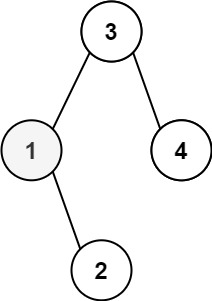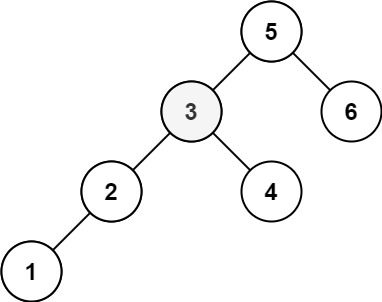【LeetCode】230. Kth Smallest Element in a BST 解題報告
230. Kth Smallest Element in a BST / Medium
Given the root of a binary search tree, and an integer k, return the kth smallest value (1-indexed) of all the values of the nodes in the tree.
Example 1:

Input: root = [3,1,4,null,2], k = 1
Output: 1
Example 2:

Input: root = [5,3,6,2,4,null,null,1], k = 3
Output: 3
Comstraints
- The number of nodes in the tree is n.
- 1 <= k <= n <= 10^4
- 0 <= Node.val <= 10^4
- Follow up: If the BST is modified often (i.e., we can do insert and delete operations) and you need to find the kth smallest frequently, how would you optimize?
Solution 1: Traverse and store
思路
因為 BST 如果用 inorder 去尋訪的話會是排序過的,所以我們先用 inorder 尋訪一次,並用陣列紀錄順序。接著直接取出 index k-1 的值就好。
效能
Complexity
- Time Complexity: O(N)
- Space Complexity: O(N)
LeetCode Result
- Runtime: 20 ms
- Memory Usage: 24.2 MB
- https://leetcode.com/submissions/detail/719058614/
Code
1 | class Solution { |
Solution 2: Iterate with Stack
思路
如果改用 Stack 來尋訪,可以在走到第 k 次時直接 reture 答案。
效能
Complexity
- Time Complexity: O(N)
- Space Complexity: O(N)
LeetCode Result
- Runtime: 21 ms
- Memory Usage: 24.2 MB
- https://leetcode.com/submissions/detail/719063735/
Code
1 | class Solution { |
